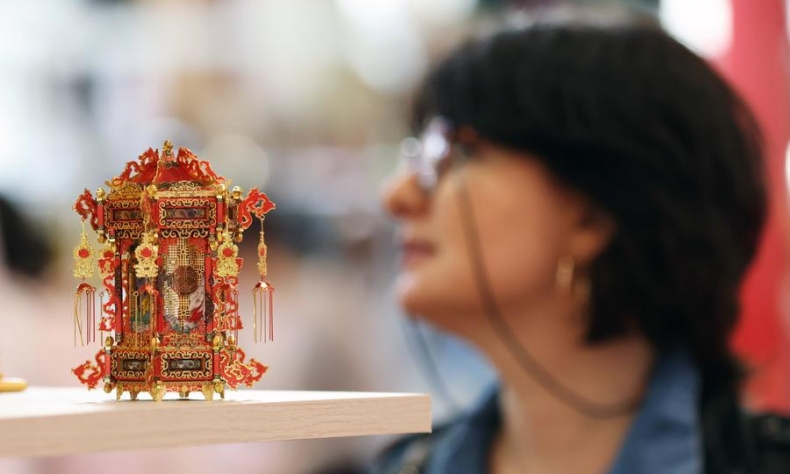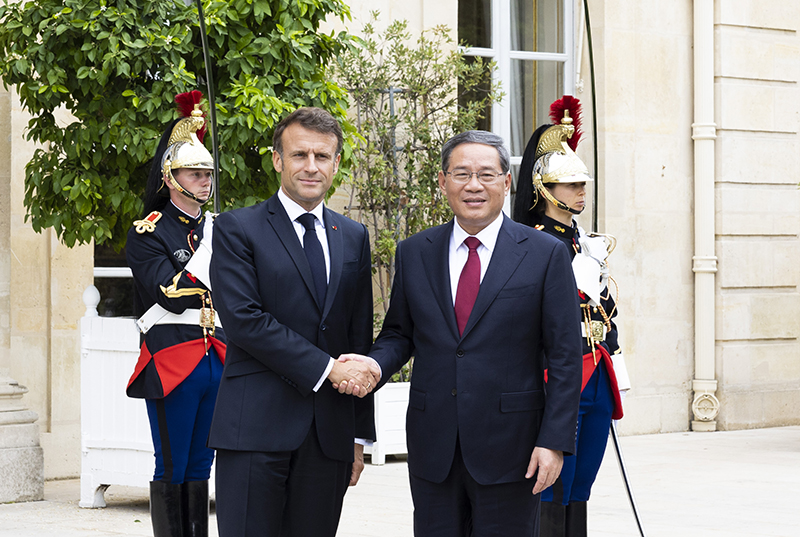Advancing Sino-French Relations to Another 60 Years of Success

Sino-French relations have set a shining example of how countries with different systems, civilizations, and levels of development can achieve peaceful coexistence and mutual benefit.
On January 27, 1964, guided by our visionary leaders of strategic courage – Chairman Mao Zedong of the People’s Republic of China and General Charles de Gaulle of the French Republic, the two countries broke through the barriers of the Cold War and officially established diplomatic relation. This event constituted “a diplomatic nuclear explosion,” according to Western media observers of that time. During the following 60 years, the two countries have always upheld the principles of independence, mutual understanding, strategic vision, and mutual benefit, a commitment they made when establishing diplomatic ties. These principles have allowed bilateral relations to stand the test of changing times, and stay at the forefront of China’s relations with the Western world.
France was the first developed Western country to establish a comprehensive partnership and conduct strategic dialogue with China, open a cultural center and hold the Year of Culture with China reciprocally, launch a civil aviation line with China, start cooperation in civilian nuclear energy, and explore the third-party market cooperation with China. Sino-French relations have set a shining example of how countries with different systems, civilizations, and levels of development can achieve peaceful coexistence and mutual benefit.
Over the years, economic and commercial cooperation between the two countries has continued to grow ever closer. Today, France is China’s third largest trading partner and the third largest source of actualized investment in the European Union, while China is France’s top trading partner in Asia and seventh largest trading partner worldwide. High-quality French products, such as Bordeaux wines, L’Oréal beauty products, and cheese in all its varieties, are becoming increasingly popular among Chinese consumers. At the same time, Chinese products are entering more French homes. China-made Christmas gifts bring surprise and joy to French children; many young French people choose Chinese mobile phone brands like Huawei, Honor, and Xiaomi; and electric cars from China, such as those manufactured by BYD and MG, are running on the streets of Paris.
The friendship between the two peoples over the past decades has grown stronger. China is now a main source of international students in France – nearly 30,000 Chinese studied in France in 2022. Close to 1,000 French primary and secondary schools are offering Chinese language courses, attracting over 100,000 students as a result. The Eiffel Tower in Paris and lavender fields in Provence fascinate Chinese tourists, while the Great Wall in Beijing and the Terracotta Warriors in Xi’an amaze French travelers.
France and China have demonstrated a strong sense of responsibility as major countries in international affairs. They have maintained close consultation on hot-button issues, such as the Israeli-Palestinian conflict, and global challenges like climate change and the protection of biodiversity. Together they defend multilateralism and international equity and justice. In 2015, the two countries made joint efforts in promoting the adoption of the historic Paris Agreement at the UN Climate Change Conference, making a historic choice at a critical moment for the collective wellbeing of humanity.

In 2023, under the strategic leadership of the two heads of state, Sino-French relations yielded fruitful results. President Emmanuel Macron paid a second visit to China in three years, and Chinese Premier Li Qiang chose France for his first overseas trip after taking office, during which he attended the Summit for a New Global Financing Pact in Paris. The two countries held meetings of the strategic dialogue, the high-level economic and financial dialogue, and the high-level dialogue mechanism on people-to-people exchanges, during which they reached consensuses on a series of important issues. Since December 1, 2023, and for a period of one year, China has been granting visa-free entries to French travelers for up to 15 days. Meanwhile, France has announced that Chinese citizens with a Master’s degree and at least one semester’s study in the country will be eligible for applying a multiple-entry Schengen visa for five years. These measures are expected to accelerate recovery in visits between our two countries in the post-pandemic era.
Today’s world is undergoing changes on a scale not seen in a century. The Berlin Wall, a divisive symbol of the Cold War and bloc politics, already fell, but new barriers are shooting up. Ideological confrontation is resurfacing, the practice of creating “walled-in courtyards” is on the rise, and clashes between civilizations are causing more division and destruction. These have prompted people of foresight to worry about the future of humanity. Under these circumstances, the guiding principles for the establishment of Sino-French diplomatic relations have emerged more relevant; their bilateral relations that are mature, stable, and action-oriented are taking on greater strategic significance; and their cooperation is expanding to new fields. In a fast-changing, crisis-laden world, Sino-French relations stand out for the stability and positive energy they inject into the global landscape.
The year 2024 marks the 60th anniversary of China-France diplomatic relations and the Sino-French Year of Culture and Tourism, ushering bilateral ties to a new historic starting point. The two countries should carry forward the good tradition, work toward the future, and continue to set an example of healthy relations between major countries by upholding the principle of equality, respect and mutual trust. They should gain an objective, progressive understanding of each other, and maintain partnership by transcending their differences. They must unequivocally oppose “decoupling” and supply chain disruption, and remain major players in pursuing openness and cooperation. They should take the lead in promoting multilateral collaboration in the spirit of building a community with a shared future for humankind. And they should ensure the success of people-to-people exchange activities scheduled for 2024, reinforcing their comprehensive strategic partnership and increase its vitality. With all these efforts, the two nations will witness how Sino-French cooperation continues to lead the world.
China and France both boast a long history and a splendid culture. Their relationship, accordingly, has a rich historical heritage and limitless possibilities for the future. I hope that Chinese and French people from all walks of life will continue to closely follow and promote exchanges and cooperation in various fields between the two countries, and contribute to the creation of an ever brighter future for Sino-French relations in the next 60 years.
Lu Shaye is China’s ambassador to France.
 Facebook
Facebook
 Twitter
Twitter
 Linkedin
Linkedin
 Google +
Google +










